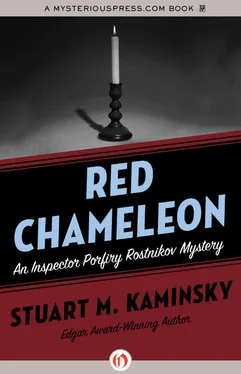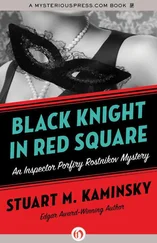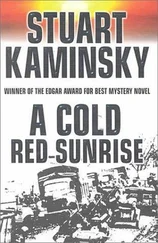Stuart Kaminsky - Red Chameleon
Здесь есть возможность читать онлайн «Stuart Kaminsky - Red Chameleon» весь текст электронной книги совершенно бесплатно (целиком полную версию без сокращений). В некоторых случаях можно слушать аудио, скачать через торрент в формате fb2 и присутствует краткое содержание. Год выпуска: 2012, ISBN: 2012, Издательство: MysteriousPress.com/Open Road, Жанр: Полицейский детектив, на английском языке. Описание произведения, (предисловие) а так же отзывы посетителей доступны на портале библиотеки ЛибКат.
- Название:Red Chameleon
- Автор:
- Издательство:MysteriousPress.com/Open Road
- Жанр:
- Год:2012
- ISBN:978-1-4532-6632-8
- Рейтинг книги:4 / 5. Голосов: 1
-
Избранное:Добавить в избранное
- Отзывы:
-
Ваша оценка:
- 80
- 1
- 2
- 3
- 4
- 5
Red Chameleon: краткое содержание, описание и аннотация
Предлагаем к чтению аннотацию, описание, краткое содержание или предисловие (зависит от того, что написал сам автор книги «Red Chameleon»). Если вы не нашли необходимую информацию о книге — напишите в комментариях, мы постараемся отыскать её.
Red Chameleon — читать онлайн бесплатно полную книгу (весь текст) целиком
Ниже представлен текст книги, разбитый по страницам. Система сохранения места последней прочитанной страницы, позволяет с удобством читать онлайн бесплатно книгу «Red Chameleon», без необходимости каждый раз заново искать на чём Вы остановились. Поставьте закладку, и сможете в любой момент перейти на страницу, на которой закончили чтение.
Интервал:
Закладка:
With that she turned and walked to a door, her heels clicking on the wooden floor, and made her exit.
Rostnikov, uncertain of the directions she had given, limped down the corridor, listening for the sound of a voice, a movement. When he had turned the second corner and was headed toward a door to his right that said Stage Entrance, he heard the sound of music.
He went through the door to the stage, following the music, moved up a low flight of stairs, and found another door. Beyond this door was the rear of the stage. The music was louder, an orchestra. It was familiar and not familiar. The backstage area was even darker than the corridor. Rostnikov moved carefully toward a light ahead that accompanied the music. Beyond a chair and a bank of switches for lights, Rostnikov found himself to the right of the stage of the theater. On the stage, illuminated by an insufficient light from high above, stood a man with a mop. On a chair near the old man was an old record player. The volume was very high and the man very old.
“Lev Ostrovsky?” Rostnikov shouted over the music, but the bent man simply soaked his mophead from the pail in front of him and kept his back to the policeman. Rostnikov could see in the dim light the drying soapy trail on the polished wooden floor of the stage. Beyond the dim light in darkness were hundreds of seats. He listened to his voice break against the far wall of darkness.
The old man did not turn immediately as Rostnikov stepped forward and turned off the record player. Silence thundered, and Rostnikov was suddenly aware of the mop squeaking over the floor.
It took the old man a beat or two to realize that the music was gone. He straightened and turned to face Rostnikov. There was a slight smile fixed on the ancient face, a smile that Rostnikov recognized as not one of amusement of the moment but the permanent mask some people wore. He was a short man in trousers held up by suspenders over a long-sleeved blue work shirt. He grasped his mop in two hands and pursed his lips as he examined the heavy man in front of him.
“What was that music?” Rostnikov asked, but the old man simply continued to stare. So Rostnikov shouted his question again.
“The soundtrack from Rocky,” Ostrovsky said in a willowy voice as he looked at the record player.
“Rocky?” asked Rostnikov, feeling as if he were in some absurdist play and that hundreds of first-nighters were just behind the light, trying to suppress coughs of laughter.
“An American moving picture,” Ostrovsky explained. “I bought it from an American. Actually, I traded for two tickets to Vassa Zheleznova. I got the better deal.”
Rostnikov nodded in agreement, partly to preserve his voice and partly because he could think of no appropriate rejoinder.
“‘He reminds me of a policeman’,” the old man said, his smile still fixed, his right hand leaving the mop to point at Rostnikov. “‘A policeman I once knew. In our theater in Kostroma we used to have a policeman-a tall fellow with bulging eyes. He didn’t walk. He ran, didn’t just smoke but practically choked on the fumes. One got the impression he wasn’t so much just living as jumping and tumbling, trying to reach for something quick. Yet what he was after, he himself didn’t know.’”
“I’m-” Rostnikov said, but he had forgotten to shout, and the old man continued, no longer looking at the policeman but out into the audience.
“‘When a man has a clear objective, he proceeds toward it calmly. But this one hurried. And it was a peculiar kind of haste-it lashed him on from within-and he ran and ran, getting in everybody’s way, including his own. He wasn’t avaricious. He only wanted avidly to do all he had to do as quickly as he could. He wanted to get all his duties out of the way, not overlooking the duty of taking bribes. Nor did he accept bribes. No, he grabbed them in a hurry, forgetting even to thank you. One day he got himself run over by some horses and was killed.’”
The old man turned to face Rostnikov, who was now convinced that he was dealing with senility and had best be simply polite and depart.
“Did your policeman have a name,” Rostnikov said. “This one does.” He pulled out his wallet and displayed it, though the man had obviously recognized him for what he was.
“There was no policeman,” Ostrovsky said, shaking his head. “I was acting. You couldn’t tell I was acting? That’s the goal, the very thing all these young actors miss the point of. That business about the policeman was one of Tatyana’s speeches from Gorky’s Enemies. Have you ever seen it? “
“No,” Rostnikov admitted. The stage was cool, and the chief inspector half expected the ghosts of past audiences to reveal themselves and laugh at his confusion.
“Too much talk,” the old man said, holding up his arthritic right hand and opening and closing it to show what talk was. “But I got you, huh? I can still act circles around these people today, these actors.”
He demonstrated his ability to act circles around those who frequented the stage by swirling his mop in a circle on the floor.
“I can see that,” Rostnikov said.
“I actually met Anton Chekhov when I was a boy,” Ostrovsky said, pointing to a spot on the stage where he presumably met Chekhov. “Right here.”
“Chekhov died before you were born,” Rostnikov said.
“Then it was Tolstoy I met,” the old man said with a shrug.
“Abraham Savitskaya,” Rostnikov said. His leg was beginning to stiffen. He shuffled to the single chair on the stage, moved the record player to the floor, sat, and looked up at the old man, who had been struck dumb by the name from antiquity.
“He’s dead,” said Ostrovsky, his permanent smile going dead.
“How did you know?” Now Rostnikov was directing, acting to the nonexistent audience. He was back in his familiar role.
“Everyone’s dead.” The old man shrugged. “I have a stage to mop.”
“Mikhail Posniky,” Rostnikov shouted as the old man made a move to resume his work. The name stopped his motion. Rostnikov had a few more he could pull out if need be.
“Dead,” Ostrovsky said.
“No, I think he murdered Abraham Savitskaya two nights ago here in Moscow.”
“I haven’t seen either of them for … a thousand years,” Ostrovsky said. “Who can remember-”
“You remember lines from old plays.”
“Ah,” the old man said, his smile strong and crinkly. “That is fantasy, easy to recall. Reality, now that is not nearly as real to an actor.”
How long could an eighty-year-old man stand up? It was an experiment that Rostnikov might have to make to get some answers.
“A brass candlestick,” Rostnikov said. “Do you remember a brass candlestick that Abraham Savitskaya owned?”
The old man’s face looked blank, and he began to shake his head when an image came, a memory. He shuffled a foot for new balance.
“No, it was Mikhail who left with the candlesticks,” he said, seeing some vague image in the past. “Mikhail and Abraham left together, going to America, they said. Each had a little suitcase, and Mikhail had the candlestick. His mother had given it to him just before he left. Why do I remember such things, such details? Who wants to remember such things?”
Rostnikov had no answer, only questions. “And have you seen either of them since they left the village, left Yekteraslav?”
“Who?”
“The men, Posniky or Savitskaya.”
Ostrovsky shrugged. “Rumors-I heard rumors from people I ran into from the village, just rumors, rumors, rumors. You know rumors?”
“I know rumors,” Rostnikov admitted to the parched mask of a smiling face that moved slowly toward him. “What kind of rumors?”
Читать дальшеИнтервал:
Закладка:
Похожие книги на «Red Chameleon»
Представляем Вашему вниманию похожие книги на «Red Chameleon» списком для выбора. Мы отобрали схожую по названию и смыслу литературу в надежде предоставить читателям больше вариантов отыскать новые, интересные, ещё непрочитанные произведения.
Обсуждение, отзывы о книге «Red Chameleon» и просто собственные мнения читателей. Оставьте ваши комментарии, напишите, что Вы думаете о произведении, его смысле или главных героях. Укажите что конкретно понравилось, а что нет, и почему Вы так считаете.












